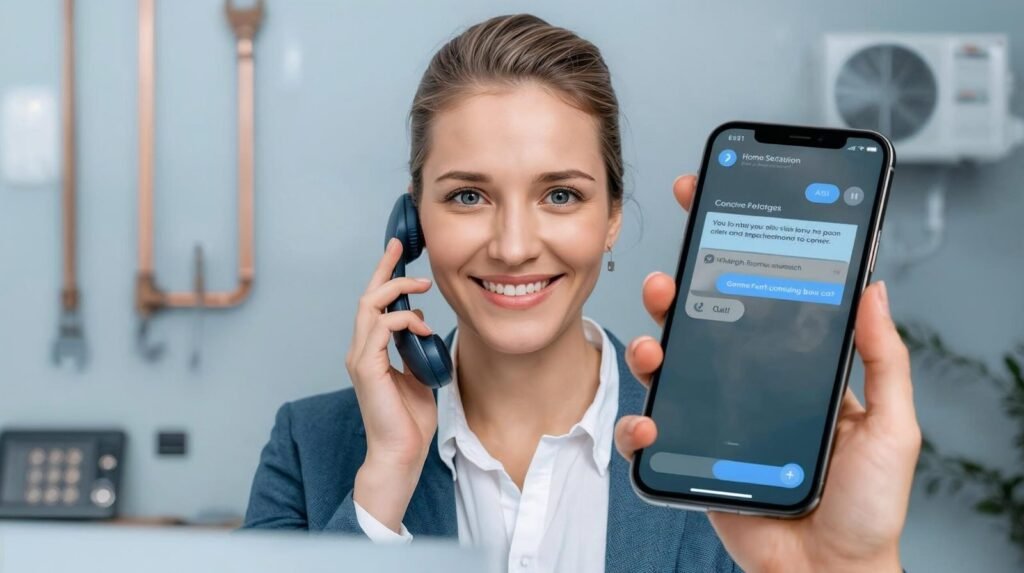For home service businesses such as plumbing, HVAC, pest control, and electrical work, customer communication is one of the most important drivers of growth. A missed call or a slow response can mean losing a potential job. That’s why business owners often ask whether AI chatbots or human receptionists provide the best customer support. Both have strengths and weaknesses, and the right choice depends on your goals, budget, and customer expectations.
The Role of Reception in Home Service Businesses
Your receptionist or customer support system acts as the first point of contact for potential customers. Quick response times help capture leads and convert them into scheduled appointments. On the other hand, slow replies can push customers to a competitor. In home services, where customers usually need urgent help, the way you handle reception directly impacts revenue and reputation.
What Are AI Chatbots in Home Services?
AI chatbots are automated systems that use artificial intelligence to interact with customers. They can answer common questions, collect information, and schedule appointments through your website, SMS, or social media channels. Unlike human receptionists, chatbots are available around the clock. That means customers can get answers or book services at any time of the day or night.
Strengths of AI Chatbots for Home Services
AI chatbots offer several clear advantages for home service businesses:
-
Immediate responses: Customers get answers instantly, no matter the time.
-
Scalability: Chatbots can handle multiple conversations at once.
-
Cost savings: They reduce the need for full-time reception staff.
-
Data insights: Chatbots record questions, preferences, and booking trends that help you improve marketing and operations.
These features make chatbots especially useful for smaller businesses that cannot afford missed calls during evenings or weekends.
Limitations of AI Chatbots in Customer Interaction
Despite their strengths, AI chatbots have limits. They may not handle complex questions well, and their responses can feel generic in certain situations. Some customers prefer speaking to a person when they need reassurance or want to explain a unique problem. If a chatbot cannot provide the right answer, the customer might get frustrated and leave.
Human Receptionists in Home Service Businesses
Human receptionists bring empathy and adaptability that technology cannot fully replace. They can understand tone, respond with reassurance, and adjust their communication style to each customer. This is valuable in home services where customers may be stressed due to urgent issues like a burst pipe or a broken air conditioner. However, human receptionists typically work during business hours, which means calls outside of that window may go unanswered. Hiring full-time or after-hours staff also increases costs.
AI Chatbots vs. Human Receptionists: Direct Comparison
When comparing both options, the differences are clear:
-
Availability: Chatbots work 24/7, while humans have limited schedules.
-
Cost: Chatbots are more affordable in the long run, while receptionists require ongoing wages and training.
-
Customer experience: Receptionists provide empathy, while chatbots provide speed.
-
Scalability: Chatbots can handle high volumes of inquiries at once, while human staff can only manage one call at a time.
Hybrid Approach: Best of Both Worlds
Many home service businesses find success with a hybrid model. In this setup, AI chatbots handle initial inquiries, FAQs, and appointment scheduling, while human receptionists step in for more complex calls. This approach ensures customers get immediate responses but still have access to personal support when needed. Over time, this balance helps reduce costs without sacrificing customer satisfaction.
Which Works Best for Home Service Businesses?
The best option depends on the size of your business and your customer base. If you run a small plumbing or HVAC company, chatbots can help you manage calls outside of business hours. If you operate a larger business, combining both options ensures you cover volume and personal interaction. The key is to match your communication strategy with the needs of your customers and your capacity to respond.
Conclusion
Both AI chatbots and human receptionists offer value for home service businesses. Chatbots provide speed, affordability, and 24/7 coverage, while human receptionists bring empathy and adaptability. Many businesses see the most benefit by using both in a hybrid model. At Trade Pulse Marketing, we help home service companies adopt the right communication tools so they can capture more leads and improve customer satisfaction.
FAQs
1. What are AI chatbots and how do they help home service businesses?
They are automated assistants that answer customer questions, schedule services, and provide support 24/7.
2. Are chatbots cheaper than hiring a receptionist?
Yes, chatbots are usually less expensive over time, since they don’t require wages or benefits.
3. Do customers prefer speaking with humans over chatbots?
Many customers prefer humans for complex issues, but chatbots are accepted for quick questions and booking.
4. Can chatbots handle service bookings and scheduling?
Yes, most AI chatbots can connect with booking systems to schedule appointments automatically.
5. What tasks are better managed by human receptionists?
Handling complex issues, providing reassurance, and building long-term customer relationships.
6. Is a hybrid model of chatbots and receptionists effective?
Yes, it combines the efficiency of chatbots with the empathy of human staff.
7. How do chatbots improve lead capture for plumbers, electricians, or HVAC companies?
By providing instant responses and booking options, chatbots ensure potential customers do not leave due to slow replies.

